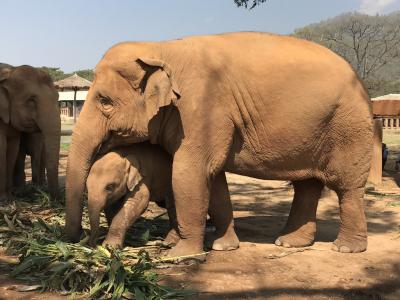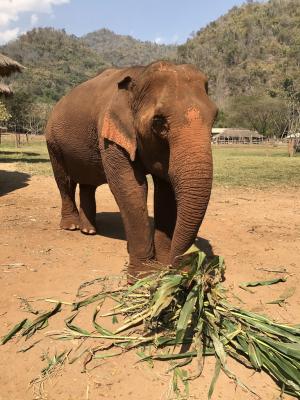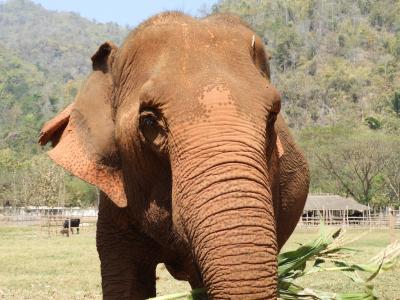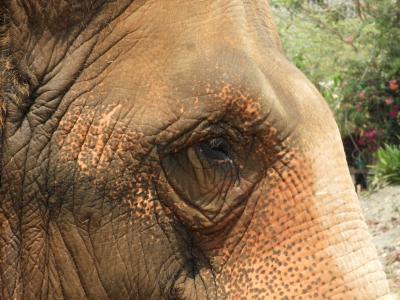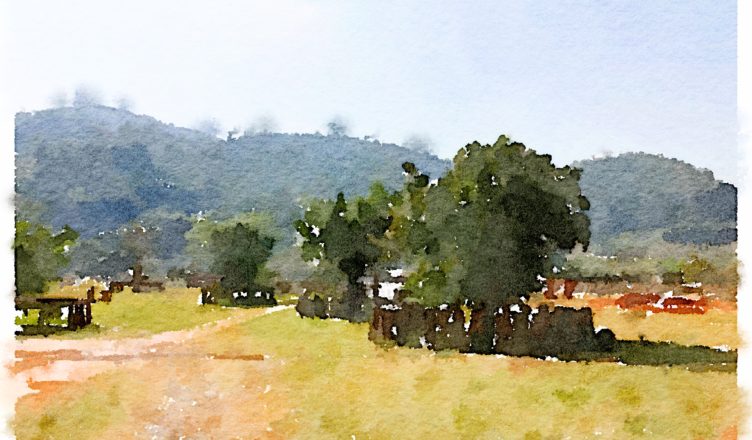Lakyim—her name in Thai means “dimples”—is taken from her parents just before her third birthday.
They are shot trying to protect her and left for dead. Uncooperative and combative adults are useless, but the young ones, they can be molded, they can be trained to be valuable, they can be crushed into subservience.
Lakyim is loaded into the back of a truck. Time passes, she doesn’t know how long. She arrives disoriented, sickened, and weakened from the trip and the ordeal of being taken from her parents. The men drag her into the woods; when she resists she is beaten with a metal-studded stick. By the time she is chained to the trees, she is bloody, delirious, and barely conscious.
She is left overnight, chained and shackled between the trees. Then all the next day, the next night, and the day after that. When the men return she is starving, nearly dead from dehydration. The insects alone, which she can’t swat away, have left her nearly insane. The men give her just enough water to keep her alive, just enough bitter and foreign food to keep her from passing out.
By the next day her ankles are bloodied from the shackles. Insects swarm to the wounds, but there is nothing she can do. The men return periodically to beat her with the studded stick, to whip her, to strike her, all while taunting her so that she cringes when they hear her call her name.
The next day, she is so weak she can hardly stand. She has contemplated ending it, wondered if she could somehow wrap the chains around her neck. The men mercifully take off her chains, though the mercy is short-lived. She is given water and food. One of the men speaks sternly to her, but it’s not a language she understands. She can only hope that he does not beat her.
Lakyim is lead to another clearing. The man ties her to a pole and leads her in a circle around it saying the same word over and over, beating her if she pauses or slows. She comes to understand the word to mean walk. She plods and stumbles on deliriously, around and around in a circle. She will do anything to avoid being beaten with the studded stick.
Days pass. She learns more of their language. Walk. Stop. Push. The words are always commands. Lakyim comes to hate hearing her own name. When the commands stop, she is chained to the trees again, given token amounts of food and water, and left unable to defend herself from the insects. She must relieve herself where she stands, and endure standing in her own waste until the next day, when the commands and the circling start again.
When she no longer hates hearing her name, the moment she no longer cares, when nothing matters to her anymore, the crush is complete. She is more a zombie now. A thin, emaciated ghost has taken Lakyim’s place. The men issue commands and she obeys.
She’s sold a few days later. The woman who buys her uses the same strange language as the men, the same familiar commands. The woman shows Lakyim that she has a studded stick, waves it threateningly in front of her eyes, but she does not beat her with it. Lakyim has learned how to avoid the studded stick.
She and the woman walk for hours. They go to the city, a place Lakyim has never seen, never even imagined. There are hundreds, maybe thousands, more people. Lakyim eyes them carefully; fortunately, none of them carry the fearful sticks. She and the woman simply stand on street corners and beg, and people give the woman money. The woman gives Lakyim commands, Lakyim obeys, and the people give the woman money.
The woman takes her home late every night and locks Lakyim in a shed just large enough for her to turn around. But at least the woman feeds her, though sometimes—if the begging is not a success—Lakyim gets little to eat.
Weeks, months, and years pass. The older Lakyim gets, the less “cute” she is, the more the woman loses interest in her. The younger ones fetch more gifts. So long as they’re cute, begging on the street pays. But as Lakyim gets older, the woman’s patience wears thin. The woman feeds Lakyim less and less, and Lakyim is beaten—whether just to remind her that the woman has the stick, or out of the woman’s frustration, Lakyim doesn’t know and doesn’t understand.
The woman eventually sells Lakyim. She knows life will be no better when the men show her their studded sticks and speak the commands to her harshly. They walk the next few days, out of the city and deep into the forest. The men feed her like the woman did: just enough to keep her alive. Once they arrive at their new home, Lakyim learns a new harsh reality, a new life of labor.
Chains are tied around her body and she is made to pull felled trees from the forest. The men shout their commands at her and beat her with their sticks, and it is all she can do, with every ounce of strength she can muster, to drag the logs. Sometimes the trees are smaller and more manageable, but other times the trees are simply too big, Lakyim too weak, and the men beat her. Even with blood running down her sides, she is unable to pull some of the logs out of the forest.
Years pass. From time to time there is a “reprieve” from the labor of dragging trees from the forest. A steel cage is strapped to her back, people climb into the cage, and Lakyim is told to walk. Nature did not design her back to accommodate the weight of the steel cage and the humans within it, but the ever-present men with sticks remind her of her place in life. She obeys. She walks. And her spine begins to curve such that even standing still is painful.
She has seen others of her kind at work in the woods. They are like her: crushed. They are soulless zombies, dragging trees, carrying people. Still, she has fared better than some. One of her kind stepped on a mine once; the men killed her in the woods because she could no longer work.
One day two men come and speak with the men who normally drive Lakyim with the sticks. Money is exchanged and Lakyim leaves with the new men. They are different, these men: there are no sticks. And there is no days of walking: Lakyim is loaded into a truck that is full of fresh, sweet greens and a seemingly endless supply of clear, cool water. To Lakyim it seems she is in heaven.
When the truck stops and the door opens, Lakyim looks out into a wide plain without fences. Without trees and chains. Without poles surrounded by circular ruts. And without men with studded sticks. Lakyim cautiously emerges from the truck. A few yards away a man places a large basket on the ground. He smiles at her. He is gentle, welcoming. The men who had brought her there walk toward the man and the basket, but they don’t use the commands. They just walk that way, so Lakyim—knowing nothing better—walks that way too.
In the basket is watermelon. Glorious, delicious, fresh watermelon.
Over the coming days, the men learn that Lakyim is uncomfortable when they mention her name. She winces and is hesitant when they call her Lakyim. So they give her a new name, Tasway. In Thai, it means pretty eyes. And across the plain, next to the cool, inviting river, more of her kind stand watching her, inviting her to join them with their eyes.
Tasway is, of course, an elephant. She is fictional, but her story is not. More than 70 of her kind have been rescued and now live in the Elephant Nature Park about an hour north of Chiangmai, Thailand. The crush has permanently damaged most of them psychologically and they are unable to live in the wild, so they enjoy a home here. A home free of sticks with metal studs.
Still, the elephants here are wildly fortunate. About half of the elephants in Thailand are wild, half are captive. The former’s numbers are dwindling due to habitat loss, and the latter’s prospects—despite that street begging and working in the logging industry is now illegal—are not much different than that of Lakyim’s in my story above.
Elephants are amazing creatures. Recent videos floating around the Internet clearly demonstrate elephants exhibiting grief at the loss of one of their herd. And elephants—with the great apes and dolphins—are among the only animals known to be self-aware: when they see themselves in the mirror, they know they are looking at themselves. This is a great leap in cognitive ability, and it means that Lakyim knew, when she was being crushed, that her life, once torn from her parents, was going to be very, very different.
Consider this: some elephants commit suicide during the crush. Some elephants will purposefully strangle themselves rather than endure the pains of this horrific process.
Should you ever go to Asia and be tempted to ride an elephant, I hope you remember Lakyim’s story.
